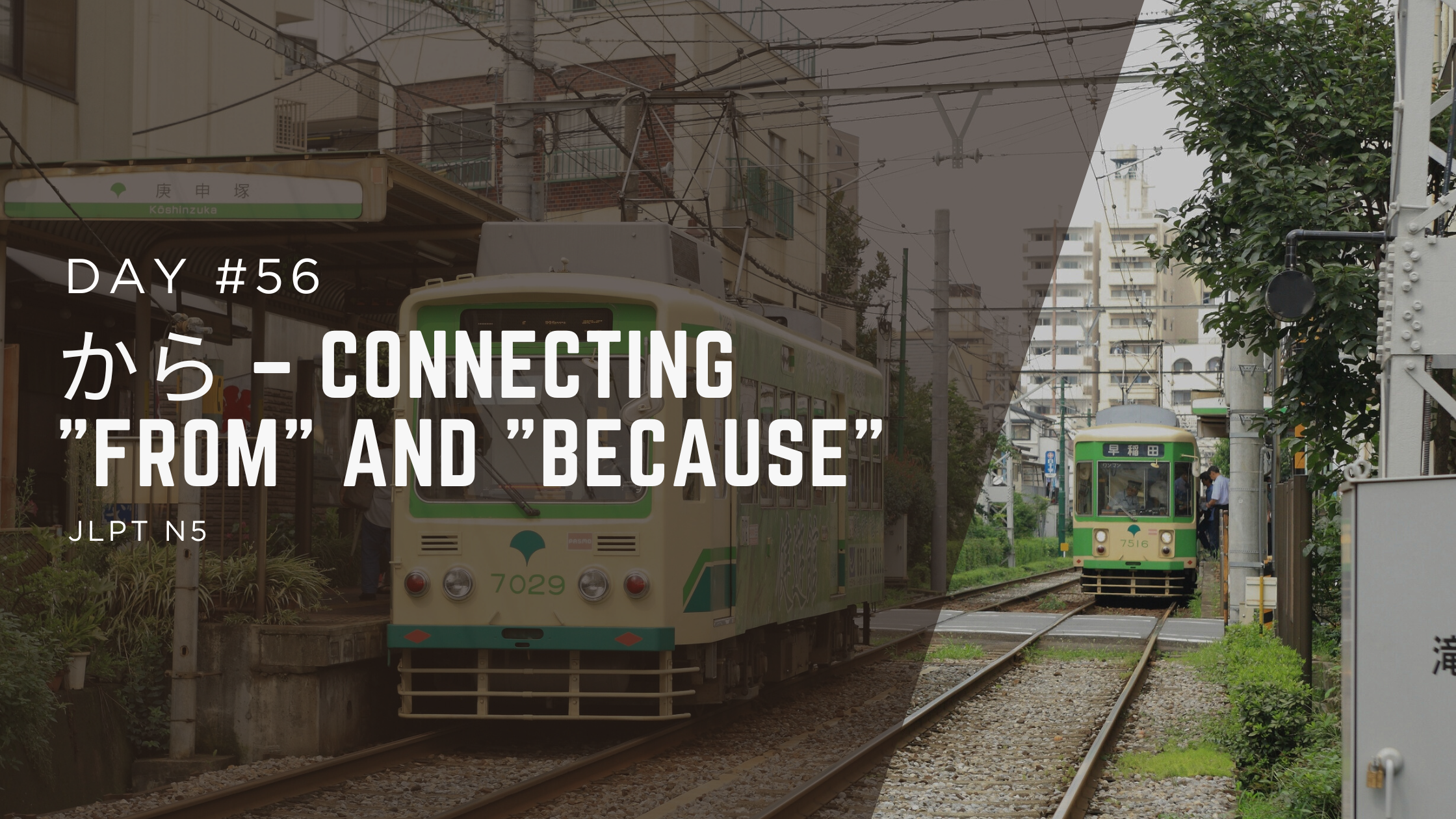Welcome to Day 56 of your 100-Day JLPT N5 Challenge.
Today’s grammar point, から, may seem small, but it is one of the most practical tools in Japanese. You will use it to express both origin (“from”) and reason (“because”).
This single word allows you to connect ideas smoothly. For example:
- I study Japanese because it’s interesting.
- I came from Tokyo.
Being able to explain “why” or “from where” something happens will make your Japanese sound clear and confident.
Main Lesson: How to Use から (from / because)
Meaning
から is used in two basic ways at the JLPT N5 level:
- To express the starting point of time or place – “from”
- To express a reason or cause – “because”
Let’s look at both meanings in detail.
から meaning “from”
Structure:
Noun + から
| English | Japanese | Example |
|---|---|---|
| from Tokyo | とうきょう から | わたし は とうきょう から きました。 (I came from Tokyo.) |
| from 9 o’clock | くじ から | しごと は くじ から です。 (Work is from nine o’clock.) |
| from the bus | バス から | バス から おります。 (I get off the bus.) |
Pronunciation tip: say ka-ra clearly. The “r” sound is light, not as strong as in English.
から meaning “because”
Structure:
Sentence + から + result
| English | Japanese | Example |
|---|---|---|
| because it’s cold | さむい から | さむい から まど を しめます。 (I will close the window because it’s cold.) |
| because I’m busy | いそがしい から | いそがしい から あそびません。 (I won’t hang out because I’m busy.) |
You can use から in both polite and casual speech.
Polite:
はやく いきたかった から、タクシー に のりました。
(I took a taxi because I wanted to go quickly.)
Casual:
ねむい から、ねる。
(I’m sleepy, so I’ll go to bed.)
Vocabulary
| Verbs | Masu form | Meaning |
|---|---|---|
| まつ | まちます | to wait |
| はじまる | はじまります | to begin |
| すわる | すわります | to sit |
| おきる | おきます | to wake up |
| はしる | はしります | to run |
| Nouns | Romaji | Meaning |
|---|---|---|
| バス | basu | bus |
| メール | meeru | |
| テスト | tesuto | test |
| あさごはん | asagohan | breakfast |
| へや | heya | room |
| Adjectives | Romaji | Meaning |
|---|---|---|
| さむい | samui | cold |
| ちいさい | chiisai | small |
| きびしい | kibishii | strict |
| はやい | hayai | early / fast |
| うるさい | urusai | noisy |
Example Sentences
きょう は さむい から、コート を きます。
(Kyou wa samui kara, kooto wo kimasu.)
- It’s cold today, so I’ll wear a coat.
バス から おります。
(Basu kara orimasu.)
- I get off the bus.
あさごはん を たべなかった から、いま おなか が すいています。
(Asagohan wo tabenakatta kara, ima onaka ga suiteimasu.)
- Because I didn’t eat breakfast, I’m hungry now.
メール から しゃしん が きました。
(Meeru kara shashin ga kimashita.)
- A photo came from an email.
テスト が たいへん だった から、つかれました。
(Tesuto ga taihen datta kara, tsukaremashita.)
- I’m tired because the test was hard.
おそく おきた から、はしります。
(Osoku okita kara,hashirimasu.)
- Because I woke up late, I run.
うるさい から ドア を しめて ください。
(Urusai kara doa wo shimete kudasai.)
- Please close the door because it’s noisy.
この へや は ちいさい から すき です。
(Kono heya wa chiisai kara suki desu.)
- I like this room because it’s small.
きびしい せんせい から にほんご を ならいました。
(Kibishii sensei kara nihongo wo naraimashita.)
- I learned Japanese from a strict teacher.
あした は やすみ だから、うれしい。
(Ashita wa yasumi da kara, ureshii.)
- I’m happy because tomorrow is a day off.
Difference between い-adjectives and な-adjectives
1. い-adjectives
Examples:
さむい (cold), ねむい (sleepy), たのしい (fun)
When giving a reason using から (because), you can attach から directly after the adjective.
Rule:
い-adjectives + から
Examples:
さむい から、コート を きます。
(Samui kara, kooto wo kimasu.)
It’s cold, so I’ll wear a coat.
ねむい から、ねます。
(Nemui kara, nemasu.)
I’m sleepy, so I’ll sleep.
2. な-adjectives
Examples:
すき (like), じょうず (good at), きれい (beautiful/clean)
When giving a reason using から, you must add だ after the adjective before から.
Rule:
な-adjectives + だ + から
Examples:
すき だ から、よく たべます。
(Suki da kara, yoku tabemasu.)
I like it, so I eat it often.
きれい だ から、しゃしん を とります。
(Kirei da kara, shashin wo torimasu.)
It’s beautiful, so I take pictures.
Conclusion
The grammar point から helps you connect ideas naturally. You can explain where something starts (“from”) or why something happens (“because”). Learning how to use から correctly will make your speech sound logical and natural.
You’ve reached Day 56, more than halfway through the challenge. Keep reviewing, stay consistent, and your goal of passing JLPT N5 is getting closer every day.



